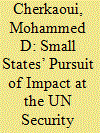| Srl | Item |
| 1 |
ID:
192917


|
|
|
|
|
| Summary/Abstract |
South Africa has served as an elected African member of the United Nations Security Council (UNSC) three times: in 2007–2008; 2011–2012; and 2019–2020. This article grapples with South Africa’s role as an active, voting participant on the UNSC during its third term, with reference to its previous UNSC tenures. Using a three-step model of voting behaviour analysis, the article highlights aspects of South Africa’s international peacekeeping obligations that interested observers have placed considerable value on, to determine its consistency in acting upon its declared foreign policy. This includes the Republic’s role in bringing the UN and African Union (AU) peace and security structures closer together and its efforts in strengthening the women, peace, and security (WPS) agenda. The study finds that the Republic has consistently built on its memory from its previous two terms, and its failures and successes, enabling it to utilize its third term in the most optimal way possible to meet its multilateral foreign policy goals.
|
|
|
|
|
|
|
|
|
|
|
|
|
|
|
|
| 2 |
ID:
192921


|
|
|
|
|
| Summary/Abstract |
In an uncharted era of the COVID 19 pandemic dilemma, Tunisia, a small nation in North Africa, served as an elected member of the Security Council in 2020-2021. The temporal framework of this Tunisian experience coincided with two variables: a. multilateralism has again come under pressure, and b. great power tensions have returned to the Security Council in the last decade. This paper aims at assessing Tunisia’s claim of a ‘successful’ record over its two-year term, and entails the exploration of what factors and stimulants, as well as constraints and challenges, were promising or degrading for a small state to engage and try to make a difference in the UNSC decision-making process. The paper also explores whether Tunisia embraced a potential well-structured African approach to working with the E10 and navigating the nuances of the P5.
|
|
|
|
|
|
|
|
|
|
|
|
|
|
|
|